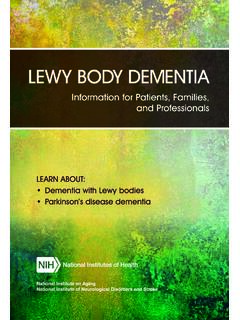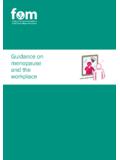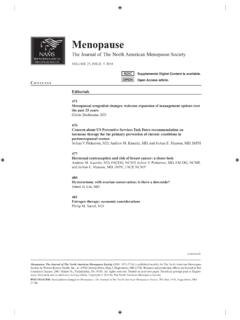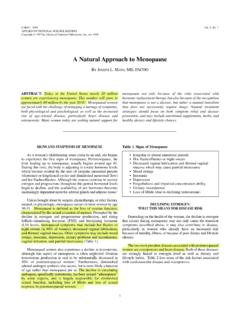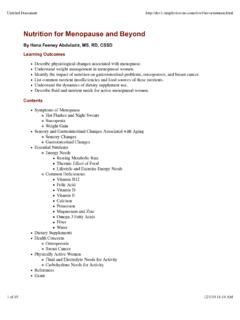Transcription of Menopause: Treatment for Symptoms
1 DEPARTMENT OF HEALTH AND HUMAN SERVICES National Institute on Aging menopause : Treatment for Symptoms Tips from the National Institute on Aging Larissa is 52. She s excited to be starting a new phase of her life as her children leave home and she has more time for her other interests. She s looking forward to traveling and taking a computer class. But, recent health changes have been getting in the way of her plans. Larissa has been having irregular periods for the past few months. Now, she s getting hot flashes and having trouble sleeping. The hot flashes, which cause her body and face to heat up quickly and uncomfortably, are waking her up several times a night.
2 Larissa is tired and irritable from lack of sleep and fed up with the hot flashes. She is ready to talk with her doctor about finding some relief. Larissa is experiencing the menopausal transition, a normal part of aging. It is not a disease or disorder. After the menopausal transition, many women feel relieved they no longer have to worry about painful periods, cramps, or getting pregnant. Some women don t have any trouble with menopausal Symptoms . For others, the menopausal transition can bring hot flashes, trouble sleeping, moodiness and irritability, pain during sex, or depression. Some may decide to talk with their doctor about treatments for their Symptoms .
3 There are many factors to consider when thinking about treating menopausal Symptoms . What Is menopause ? The menopausal transition most often begins between ages 45 and 55. It usually lasts about 7 years but can last as long as 14 years. During the menopausal transition, the body s production of estrogen and progesterone, two hormones made by the ovaries, varies greatly. Bones also become less dense, making women more vulnerable to fractures. During this period, too, the body begins to use energy differently, fat cells change, and women may gain weight more easily. This time in a woman s life is often full of other transitions not just physical ones.
4 Women may be caring for aging parents or relatives, supporting their children as they move into adulthood, or taking on new responsibilities at work. Is It menopause ? If you are having Symptoms commonly associated with the menopausal transition, your doctor may ask questions about your age, Symptoms , and family history to determine if it really is the menopausal transition causing your Symptoms . In some cases, your doctor may suggest a blood test to check your FSH (follicle-stimulating hormone) and estradiol (E2) levels to rule out any other causes for the changes you re experiencing. The menopausal transition, sometimes called perimenopause, begins several years before a menopause : Treatment FOR Symptoms woman s last period.
5 During this time, women may experience spotty menstrual cycles, hot flashes, and other changes. While this time is commonly referred to as menopause , menopause doesn t happen until 1 year after the final menstrual period. After menopause , women enter post- menopause . Post-menopausal women are more vulnerable to heart disease and osteoporosis. At this time, it is important to eat a healthy diet and make sure you get lots of calcium to keep your bones strong. A woman who doesn t want to get pregnant should continue to use birth control for at least a full 12 months after her last period. What Are the Symptoms of menopause ?
6 Many women experience very mild Symptoms that are easily treated by lifestyle changes, like avoiding caffeine or carrying a portable fan to use when a hot flash strikes. Some women don t require any Treatment at all. Other Symptoms can be more problematic. Common Symptoms include: Hot flashes Disturbed sleep Mood swings, depression, or anxiety Vaginal dryness and pain during sex In addition, in some women, Symptoms may include aches and pains, headaches, and heart palpitations. Since menopausal Symptoms may be caused by changing hormone levels, it is unpredictable how often women will have hot flashes and other Symptoms and how severe they will be.
7 Talk with your doctor if these Symptoms are interfering with your everyday life. The severity of Symptoms varies greatly around the world and by race and ethnicity. This tip sheet explores Treatment options for common Symptoms of the menopausal transition. Hot Flashes: What Can I Do? Hot flashes are uncomfortable and can last for many years. When they happen at night, hot flashes are called night sweats. Some women find that hot flashes interrupt their daily lives. The earlier in life hot flashes begin, the longer you may experience them. Research has found that African American and Hispanic women get hot flashes for more years than white and Asian women.
8 You may decide you don t need to change your lifestyle or investigate Treatment options because your Symptoms are mild. But, if you are bothered by hot flashes, there are some steps you can take. Try to take note of what triggers your hot flashes and how much they bother you. This can help you make better decisions about managing your Symptoms . Lifestyle Changes to Improve Hot Flashes Before considering medication, first try making changes to your lifestyle. Doctors recommend women make changes like these for at least 3 months before starting any medication. If hot flashes are keeping you up at night, keep your bedroom cooler and try drinking small amounts of cold water before bed.
9 Layer your bedding so it can be adjusted as needed. Some women find a device called a bed fan helpful. Carry a portable fan to use when a hot flash strikes. Avoid alcohol, spicy foods, and caffeine. These can make menopausal Symptoms worse. If you smoke, try to quit, not only for menopausal Symptoms , but for your overall health. Try to maintain a healthy weight. Women who are overweight or obese may experience more frequent and severe hot flashes. Try mind-body practices like yoga or other self-calming techniques. Early-stage research has shown that mindfulness meditation, yoga, and tai chi may help improve menopausal Symptoms .
10 2 TIPS FROM THE NATIONAL INSTITUTE ON AGING Medications: Non-Hormone Options for Treating Hot Flashes If lifestyle changes are not enough to improve your Symptoms , non-hormone options for managing hot flashes may work for you. They may be a good choice if you are unable to take hormones or if you are worried about their potential risks. The Food and Drug Administration (FDA) has approved the use of paroxetine, a low-dose selective serotonin reuptake inhibitor (SSRI) antidepressant, to treat hot flashes. Researchers are studying the effectiveness of other antidepressants in this class. Women who use an antidepressant to help manage hot flashes generally take a lower dose than those who use the medication to treat depression.


